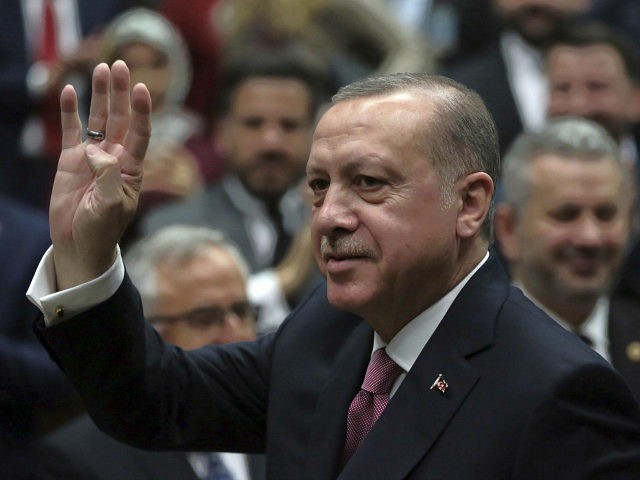Increasingly isolated in Europe, Turkish President Recep Tayyip Erdogan arrived in Algeria Tuesday for a whirlwind five-day tour of Africa intended to boost his economy and raise the diplomatic profile of his country tarnished by an ongoing invasion of Syria and repeated failures to prevent terror attacks in urban tourist centers.
Erdogan will land in four countries — Algeria, Mauritania, Senegal, and Mali — all majority Muslim countries. As the pro-Erdogan newspaper Sabah notes, Erdogan’s will be the first visit by a Turkish president to Mauritania and Mali. He has “visited Africa more than any other world leader,” the publication claims.
In Algeria so far, Erdogan has honored the nation’s martyrs and engaged Prime Minister Ahmed Ouyahia in a meeting centered largely on trade, according to Turkish newspaper Hurriyet. He also signed a diplomatic memorandum of understanding with Algeria and several economic agreements, including one on agriculture and one on hydrocarbons. Pursuant to Erdogan’s stated desire to promulgate Turkish Islamic culture, the two countries also agreed on “a cooperation protocol for utilizing the common cultural heritage between Turkey and Algeria” and a joint “Turkology project,” according to the Turkish state-run Anadolu news agency.
Yeni Safak, another pro-Erdogan outlet, notes that Erdogan lamented that even trade with Algeria, Turkey’s largest trade partner on the continent, is “minimal” and tried to change that with yet another agreement: a “$1 billion petrochemical investment deal” to build a plant in the Adana province of Turkey.
We are aware that Algeria has been negatively impacted by energy prices. In spite of all the difficulties, we must increase our efforts to increase mutual trade,” Erdoğan insisted.
Sabah notes that Erdogan’s primary concern in traveling to Africa is to “pave the way for Turkish investors in Africans market.” With over 30 trips to African countries during his tenure, Erdogan has increased trade with the continent to $17.5 billion, according to Anadolu, and intends to exponentially grow it. The model appears similar to that of China, which has launched a global version of what it has done in Africa dubbed “One Belt One Road,” intended to generate profits for Beijing with infrastructure projects throughout the world. China’s plan also relies on predatory lending to developing nations and military colonizing of territories in Africa, which Erdogan does not yet appear interested in, but he does seem to be adopting the keen interest in infrastructure that has worked well for China so far.
Like China, Anadolu argues that its countries growing presence on the continent is good for Africa. “Turkish entrepreneurs generated 78,000 jobs in Africa, and the value of projects undertaken by Turkish construction firms topped $55 billion,” the agency claims. Erdogan made similar claims while visiting Chad, Sudan, and Somalia in December, seeking to double trade with Sudan as soon as possible.
Erdogan also does not appear entirely disinterested in a military presence in Africa. Turkey debuted a military base in Somalia last September. Amid an invasion of Syria widely rejected by the United States, Russia, the Bashar al-Assad regime, and the Syrian Kurdish fighters on the ground, Erdogan’s military has much ground to make up in public opinion. Erdogan’s government has done little to assure concerned observers that the Turkish military will not become a threat to world peace, following up the invasion of northern Afrin, Syria, with a threat to invade Greece and praising the potential “martyring” of a crying six-year-old girl.
Like his trip to Africa, Erdogan is claiming that the invasion of Syria “will boost Turkey’s economy,” Anadolu reports.
“We ended 2017 with huge growth, and we began 2018 with high confidence, which is an important indicator for Turkey,” the deputy chair of Erdogan’s Islamist Justice and Development Party (AKP) Cevdet Yilmaz recently claimed, suggesting the Afrin invasion would keep that trend going. Turkish consumer confidence dropped in February following the launch of the invasion, however, and the International Monetary Fund (IMF) warned this month that Turkey faces the potential of having an “overheating” economy, more vulnerable to instability globally.

COMMENTS
Please let us know if you're having issues with commenting.